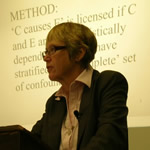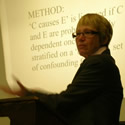Friday, 24 March 2006
We Don't Usually Electrocute Speakers We Like
The event will be recorded in our Center's calendar as Nancy Cartwright visiting in our Annual Lecture Series to speak on the topic of Hunting Causes and Using Them. That is how historical records strip the life out of real events.
It had a rocky start. We lost our usual room well after our regular announcements went out. So we sent out emergency notices about the room change and hoped everyone would hear. As we settled into our seats at the appointed hour, the strong attendance showed they had. Brian Hepburn tinkered silently and swiftly with the last minute adjustments of the overhead projector, the lapel microphone and so on. I knew that his calm exterior masked the stress of setting up two unfamiliar rooms, one for the reception to follow.
 "Where
is the theory in our 'theories' of causality?" Nancy asked, as the
talk began. In another room this would be idle chatter. In this
room it was not. The audience was packed with people whose central
professional interest lay in causation. Perhaps it was in the metaphysics
of causation. Or they were part of efforts extending over decades
to craft computer driven algorithms that bested humans in wrestling
the causal structure from the clutches of sociological data.
She had their interest. "Where
is the theory in our 'theories' of causality?" Nancy asked, as the
talk began. In another room this would be idle chatter. In this
room it was not. The audience was packed with people whose central
professional interest lay in causation. Perhaps it was in the metaphysics
of causation. Or they were part of efforts extending over decades
to craft computer driven algorithms that bested humans in wrestling
the causal structure from the clutches of sociological data.
She had their interest.
From my front row seat, I had an ideal line of sight to Nancy and the huge, glowing overhead projector screen behind her, on which the phrase "C causes E" shone. "Perfect," I thought, "All is shipshape...," at the very moment that the overhead projector emitted a pop and the screen went dark.
If this has never happened to you, you won't understand the awful, empty feeling. It is something like the dream we all have of standing up in the cavernous hall to give that speech and realizing that you are still dressed in your pjamas--the ones with the teddy bears. Or in this case, you have pulled hard on every tigers' tail and, just as they lock their yellow eyes on you, you pull on the rope that leads up out of pit and it falls broken at your feet.
A knowing look passed over Brian's face and he swept out of the room. It took me a moment longer before I remembered the slide that engages the backup bulb. I crept around to the front of the projector and slid it over--that one was burnt out too.
Nancy kept going. "I don't need the projector for this." Her worry about causation was simply stated. We want a theory of causation that both lets us hunt causes and use them. That is, it must give us the means to find causes and know that we have found them. And it must also assure us that causal knowledge is a useful thing to have. We must be able to do things in the world with it. We have many theories of causation. All of them are terrific at one. None are good at both.
That was a claim that really needed to be illustrated. The illustrations
were complicated and our chalkboard sufficed for a few simple formulae.
Now Nancy really did need more. Cecil B. De Mille could not have
scripted it better. The door opened and in walked Brian carrying
an overhead projector. There is a curious phenomenon in which an
entire crowd, unwittingly and without prior planning, sighs
like a great beast exhaling. It sighed. The table at the front was
hastily reorganized and the lectern shoved over to make room. Soon
Nancy had pulled out transparencies and covered the screen with
words and formulae.

There were many examples, some complex, some not. One especially
simple one seemed to express the worry very nicely. If this follows
that, should we say that this caused that? Daylight follows night;
so does night cause daylight? No one finds that plausible. For this
to cause that, there has in addition to be some power that this
exerts on that. In manipulation theories of causation, we identify
that extra piece with the fact that changing the cause lets us manipulate
the effect. The gas causes the gaslight; more or less gas produces
more or less light.
 Nancy
was on a roll. Nothing would derail her. Not even a loud BOOM. She
had stepped on the wire trailing from her lapel microphone so it
had fallen to the table. After a moment's confusion, she collected
the microphone and her thoughts and continued. Nancy
was on a roll. Nothing would derail her. Not even a loud BOOM. She
had stepped on the wire trailing from her lapel microphone so it
had fallen to the table. After a moment's confusion, she collected
the microphone and her thoughts and continued.
So manipulation theories excel in the "use" area. Once we know the
causes of things, we can _use_ those causes to manipulate them.
It's automatically so in this theory. But this manipulation theory
gives us no hint on how to find causes. There are no markers independent
of the use of causes. That issue of independence seemed to me to
lie behind Nancy's deeper worry. She had no qualm over the idea
that there are ways in the world that we can manipulate things.
But calling it "causation" adds nothing to the idea of manipulation
and is even positively misleading if you now come to think that
you have forged a connection with all the other things that you
call "causation" under the aegis of the many different theories
of causation.
Nancy did have a deeper worry at this point, but that was not it.
She was worried about a powerful tingling sensation in her feet
and creeping up her legs. There are things that cannot long be ignored.
Looking down, she gasped "Oh--there's a puddle of water." Then it
all fell into place. When the table had been rearranged, a glass
of water had been knocked over. The trailing wire from her microphone
now ran through the water. Brian later explained to me that the
antiquated electronics of the room needed a higher voltage for the
microphone--nothing dangerous, though.
At this moment, I thought of the cheese, grapes, wine and sodas
waiting for us on the 8th floor, the beckoning respite. Was this
the moment at which we yield to fate? I should not have underestimated
our speaker. "It will be fine," she announced, "if I keep this cable
out of the puddle."

It was fine. The talk proceeded to its denoument: we don't really
have a plurality of theories of causation; we have no theories at
all! As we proceeded to question time, I took the opportunity to
apologize publicly for all the hi jinks and to thank her for her
forebearance. She responded with a graceful, somewhat bemused smile
that let me know that some matters were too important to let the
powers of darkness and electrocution interfere.
John D. Norton
Nancy Cartwright
London School of Economics and University of California at San Diego
24 March 2006
:::
Hunting
Causes and Using Them
::: Annual
Lecture Series
|


![]()
![]()



